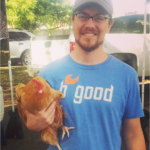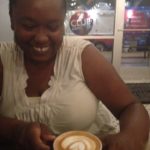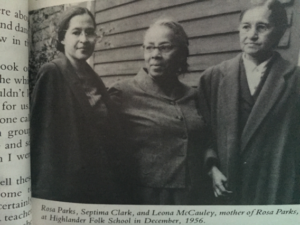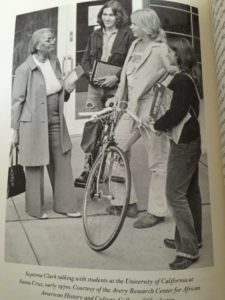(This post is one in a series on race titled “But Some of Us Are Brave.” The series includes posts from a diverse group of writers from our community. It takes a considerable amount of transparency and vulnerability for the contributors to this series to pen these posts and voice their experiences. We appreciate their courage, and we hope their willingness to be brave will spark some authentic community conversation on this sensitive and important topic. We hope you will read these posts thoughtfully and join the conversation by responding honestly and respectfully, and by sharing them with your friends and acquaintances. — ABT )
I just want to say one thing. It’s very simple and I’m not supposed to say it. I am racist. Most of the time I don’t know I’m racist and I don’t mean to be racist, but I am. I wouldn’t know much about my own racism if it weren’t for friends of color leading me and teaching me. Friends like Pastor Delvin Atchison of Antioch Baptist Church in Waco. Like my friend Luis and like my friend DeShauna.
You see, White people, like myself, need our brothers and sisters of color to teach us about racism. We are blinded to so many things by our power and our privilege. We don’t think about race every day because we don’t have to, but our brothers and sisters don’t have a choice. They understand race and racism in a way that I never can, because for them it is a lived experience, a daily struggle.
If we hope to overcome our racism and find peace and justice in cities like Ferguson, then White people must begin by confessing. We are racist. I am racist. Racism is real.
In the civil rights movement, people like Martin Luther King, Jr., Fannie Lou Hamer, Rosa Parks, Septima Clark and many more brave, unnamed souls stood up against the racist laws and treatment they received in the South. They stood together, but they were in one sense alone. They stood up without the support of their White brothers and sisters, without those who held the seats of power. They stood on their own to demand their rights and demand justice. However, it wasn’t until White people stood in solidarity with African-Americans that the nation took notice. The images of firehoses and dogs being turned on peaceful protestors galvanized White Americans to go to the South and stand with their brothers and sisters for their rights and for justice. Then when a White minister from the north was killed there was a national outcry that helped pass the Voting Rights Act of 1965. It’s not right that the death of one White man mattered more than all the deaths of Black people that came before it, but it was a reality of life in those times that the solidarity of White people with the civil rights movement helped changes to the system come about more quickly.
The hashtag and slogan #blacklivesmatter that has emerged from the experience and protests in Ferguson and elsewhere reflects the fact that the reality of life during the civil rights era continues today. We have come so far and yet still have so far to go. I do think passing laws and regulations for police officers related to racial profiling, excessive force and other issues can have a huge impact on the treatment of people of color. It is an important step, like the Civil Rights Act and Voting Rights Act. Yet no law or regulation will remove racism and prejudice from the hearts of human beings.
This is why the movement needs the confession of White people willing to stand with African-Americans and acknowledge our own complicity in the racism and systems that continue the legacies of slavery, colonization and White oppression. Without that solidarity those in power will continue to enforce the status quo and ignore the destructiveness of the systems that perpetuate racism. The hashtag reminds us that we White people must confess that White lives still matter more than Black lives.
Now, don’t get me wrong. I’m not saying that the Black community needs a White savior to ride in and solve its problems. That “White savior” complex has caused more harm than good since the Voting Rights Act was passed. As people of privilege and power from the dominant culture, we White people must be careful that our solidarity and activism begins with confession and a lot of listening. When we speak truth to power it must come from an intimate understanding and relationship with those who face the struggle against racism and oppression every day. So please stand with our brothers and sisters of color by admitting and confessing that we are racist, that we don’t know or understand our own racism and that we need our brothers and sisters of color to teach us and lead us forward if we hope to find any peace and justice.
 Lucas Land is an eco-theologian, urban farmer, writer and activist. He is avoiding growing up by constantly learning and trying new things. He is currently working toward a certificate in permaculture design. He was Urban Gardening Intern at World Hunger Relief, Inc. He worked on water and agriculture issues in Bolivia with Mennonite Central Committee. He also founded the sustainable landscaping business Edible Lawns here in Waco. He lives with his wife, three children and flock of chickens in the Sanger Heights Neighborhood in North Waco.
Lucas Land is an eco-theologian, urban farmer, writer and activist. He is avoiding growing up by constantly learning and trying new things. He is currently working toward a certificate in permaculture design. He was Urban Gardening Intern at World Hunger Relief, Inc. He worked on water and agriculture issues in Bolivia with Mennonite Central Committee. He also founded the sustainable landscaping business Edible Lawns here in Waco. He lives with his wife, three children and flock of chickens in the Sanger Heights Neighborhood in North Waco.
This article was originally published on Lucas’ blog, What Would Jesus Eat?, http://www.lucasmland.com/2014/12/01/solidarity-with-ferguson-i-am-racist/
(This post is one in a series on race titled “But Some of Us Are Brave.” The series includes posts from a diverse group of writers from our community. It takes a considerable amount of transparency and vulnerability for the contributors to this series to pen these posts and voice their experiences. We appreciate their courage, and we hope their willingness to be brave will spark some authentic community conversation on this sensitive and important topic. We hope you will read these posts thoughtfully and join the conversation by responding honestly and respectfully, and by sharing them with your friends and acquaintances. — ABT )
By DeShauna Hollie
As I sat down to write about this theme of “But Some of Us Are Brave”, I thought of my favorite “super hero” Septima Poinsette Clark. Septima lived from 1898 to 1987. She was born in Charleston, South Carolina and lived much of her life there. Although Septima lived until she was 89, and is considered by many as the grandmother of the civil rights movement, her story isn’t as widely known as those of other civil rights leaders.
As a teacher and avid civil rights activist, Septima helped pioneer some important aspects of the civil rights movement. She helped to create Citizenship Schools that addressed the barriers and unjust laws that African Americans faced when it came to registering to vote in the South. These laws varied by county and state, but many required African-American voters to be able to pass a literacy test in order to vote unless their grandfather had voted in a previous election. This disqualified most Blacks in the South, because their grandfathers had been slaves and barred from voting. Activists like Septima found ways to address these laws while at the same time protesting them.
Septima also worked with Myles Horton of the Highlander Folk School in Monteagle, TN to train other civil rights leaders and activists in non-violent civil disobedience. Rosa Parks attended one of those trainings and gatherings. Rosa went on to help lead the Montgomery bus boycott a few months later.
Septima used her training and passion as an educator to fight against systemic racism in the South. She consistently spoke up for the rights of marginalized people and continued to speak out even when her life was threatened, even when she was fired from her job as teacher for being a member of the NAACP, even when she was thrown in jail for holding integrated meetings with Whites and Blacks, and even when she was ostracized by many members in her community for using her voice to help others. She is indeed a super hero. In her later years, when asked about her work and contribution to the civil rights movement, she replied, “I don’t expect to see a utopia. No, I think there will always be something that you’re going to work on always. That’s why when we have chaos and people say, ‘I’m scared. I’m scared. I’m concerned,’ I say, ‘Out of that will come something good.’ It will too. They can be afraid of what is going to happen. Things will happen and things will change. The only thing that is really worthwhile is change. It’s coming.” (Clark, pg126)
Septima chose to continue working towards change her entire life, despite the consequences. Another quote of hers that I love goes: “It’s not that you grow old, but it is how you have grown old. I feel that I have grown old with dreams that I want to come true, and that I have grown old believing there is always a beautiful lining to that cloud that overshadows things. I have great belief in the fact that whenever there is chaos, it creates wonderful thinking. I consider chaos a gift, and this has come during my old age.” (Clark pg124)
Septima Clark is an inspiration to me and what I want my life to be like. I want to work for what I believe in my entire life. I want to work towards a more accepting society, a society that acknowledges that we are not a utopia. We have come pretty far since the days of slavery and segregation but the journey continues.
There is an elephant in the room that we are so afraid to mention. We are afraid and concerned that we may say something offensive, that we may hurt each other. The protests sparked by the shooting of Michael Brown on August 9th in Ferguson, MO, prompted questions in my mind about what I could do to stand in solidarity with that community and with others in my own community of Waco, TX, as we all grieved over the loss of a life. I’m not sure why this particular event spoke to me in a way that other shootings had not, but it made me want to take to the streets and scream “Black Lives Matter” and “Enough is Enough” along with other protesters. I love a good protest. They are invigorating and a great way to let off steam so that I can get down to the business of figuring out how to bring about the change that I am screaming about. Septima’s model of continual work and non-violence remind me that there is always a positive way to go about change.
The anger is real. The despair is real. The hurt is real. I believe it is time we made the conversation real. Although we are not Ferguson, MO,and are in Waco, TX, we have our own history of racism, prejudice and discrimination that is very real. I want Waco to prosper and I want to continue to work towards positive change in Waco. Will you join me in the conversation?
I know that conversations about change, about injustice, about past hurts and about how we move forward can sometimes be scary and hard. But dialogue with each other is the first action that we can take in being allies to each other.
 This Act Locally Waco blog post was written by DeShauna Hollie. Deshauna grew up in Waco and is infant/toddler teacher at The Talitha Koum Institute Therapeutic Nursery. The Act Locally Waco blog publishes posts with a connection to these aspirations for Waco. If you are interested in writing for the Act Locally Waco Blog, please email [email protected] for more information.
This Act Locally Waco blog post was written by DeShauna Hollie. Deshauna grew up in Waco and is infant/toddler teacher at The Talitha Koum Institute Therapeutic Nursery. The Act Locally Waco blog publishes posts with a connection to these aspirations for Waco. If you are interested in writing for the Act Locally Waco Blog, please email [email protected] for more information.
Resources:
Charon, Katherine Mellen. Freedom’s Teacher: The Life of Septima Clark. The University of North Carolina Press, Chapel 2009.
Clark, Septima Poinsette and Cynthia Stokes Brown. Ready from Within: Septima Clark and the Civil Rights Movement. Wild Trees Press, Navarro, California:1986.


